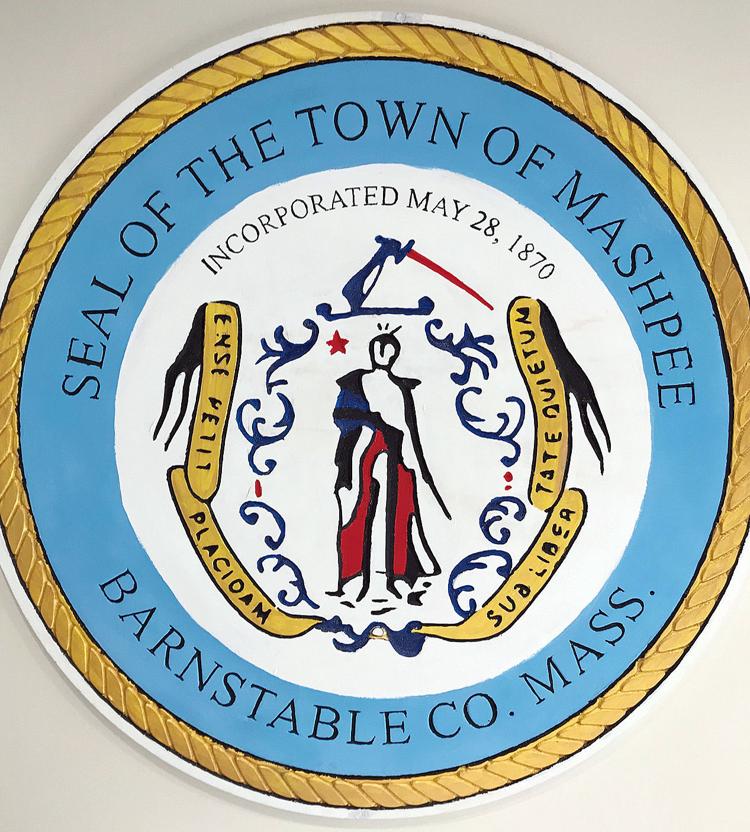Brian M. Weeden, a member of the Mashpee Wampanoag tribe, is pushing for the town to redesign its seal.
Or, more accurately, he wants the town to create its first truly original seal—one that better reflects the heritage and culture of Mashpee, Massachusetts.
Nearly 120 years ago, in April 1899, the governor signed a law requiring all cities and towns to adopt an official seal. It appears, however, that Mashpee never crafted an image of its own, according to Richard DeSorgher, a member of the Mashpee Historical Commission who writes a column for the Enterprise called "Inside the Archives."
Instead, the state delivered a seal to Mashpee that bears striking resemblance to the commonwealth's own seal, Mr. DeSorgher found in his research.
It depicts a Native American man holding a bow and arrow. Above him, a floating arm—said to be English military leader Miles Standish—raises a sword. The image recalls the painful, violent history between indigenous people and the European settlers, said Mr. Weeden, who sits on the Wampanoag Tribal Council.
Both seals bear a Latin motto that means, "By the sword we seek peace, but peace only under liberty."
Mr. Weeden recalled that, as a kid, his father would point out the seal when they came across it. Now the 26-year-old believes it's time for a change.
He submitted a petition article for May Town Meeting that, if passed, would send Mashpee back to the drawing board on its seal. Redesigning the image would help the town "write the wrongs" of the past, he said. And, for the first time, Mashpee would have a seal that captures its unique history.
Mr. Desorgher shares a few examples of other town seals in a recent column.
"Barnstable shows the Mayflower which passed her shores after leaving Provincetown and, if not for a severe snowstorm, might have become the final settlement of the Pilgrims instead of Plymouth," he writes. "Edgartown has a whaleship while Tisbury shows its early salt-works, the codfish and its original Native-American name, 'Takemmy.' "
If voters support changing the seal, Mr. Weeden said, the historical commission would lead efforts to research and redesign the seal, providing occasional updates to the board of selectmen. He is a member of the historical commission.
Mr. DeSorgher wrote that he found no records indicating why Mashpee never made an original seal, one that illustrated the town's natural beauty, its history or Wampanoag culture. His column concludes by musing: "Could it be suggested that, perhaps with Mashpee's 150th Anniversary coming up in 2020, local artists could come up and design a new seal that reflects the uniqueness of Mashpee?"
Mr. Weeden would surely say "yes." He does, however, anticipate some resistance to the article, in light of the financial costs associated with replacing the seal on officers' badges, letterhead and around town.
"But sometimes we can spend money on injustice," Mr. Weeden said.
As the board of selectmen reviewed the draft warrant for May Town Meeting earlier this week, Town Manager Rodney C. Collins made note of such costs. In a 3-1 vote, board members decided not to recommend the article.
The proposal is a petition article, so selectmen cannot vote to pull it from the warrant.
Mr. Weeden's pitch to redesign the seal is only one of three petition articles he filed for the May Town Meeting.
In another, he recommends replacing the holiday of Columbus Day with Indigenous Peoples' Day on town calendars. If voters get behind him, Mashpee would join a growing list of cities, towns, universities and even states that have made this changeover.
Indigenous Peoples' Day is a national movement to change the way people think about the settlement of the Americas and replace a holiday dedicated to Christopher Columbus with a celebration of indigenous cultures. In the last four years, the movement has picked up considerable steam.
The Mashpee Wampanoag tribe renamed the holiday on tribal calendars in 2017, Mr. Weeden having drafted the resolution approved by tribal council members. In August, the Mashpee School Committee passed its own resolution to change the holiday's name on district calendars.
Mr. Weeden said the town should be next.
"We would be one of the first Cape towns to take action like this," Mr. Weeden said. "This lets Mashpee lead, to right a lot of the wrongs between the indigenous people of this land, tribal members and the town."
The board of selectmen has yet to take a position on this article. Mr. Collins noted there are collective bargaining agreements that list Columbus Day, and he asked the board to hold off while he looks into any potential complications that could arise. The school committee addressed a similar issue before choosing to embrace Indigenous Peoples' Day.
As Town Meeting approaches, Mr. Weeden said, he will be looking to gather support for his proposals from groups like the historical commission and the school committee.
Elected to the tribal council earlier this month, Mr. Weeden said he values community engagement and is looking to get more involved with town boards and committees.
"I felt as a tribal member and a young person, I needed to give back to the town," he said. "It's not just about giving back to the tribe, but the town also."



